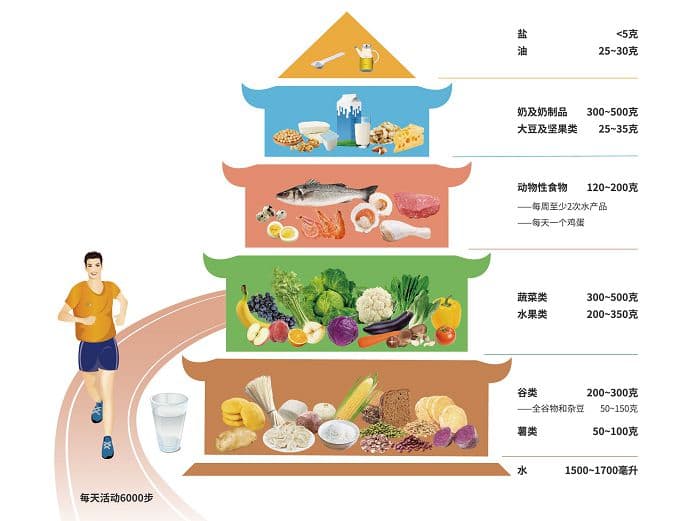Yesterday, the 2022 version of the “Dietary Guidelines for Chinese Residents” was officially released. It is said that “people take food as their heaven”. Eating is not only the most basic behavior to maintain life. Eating scientifically and reasonably can maintain good nutrition, prevent the occurrence of chronic diseases, and make health more lasting. The dietary guidelines condensed the wisdom of more than 100 experts, combined with scientific research evidence in recent years, and used easy-to-understand language to most directly instruct ordinary people what to do in terms of eating, drinking, and how to do it more scientifically and healthier.
The “Dietary Guidelines for Chinese Residents” has the following eight principles:
Criterion 1 Food is diverse and reasonable
● Adhere to a grain-based balanced diet.
● The daily diet should include cereals, potatoes, vegetables and fruits, livestock, poultry, fish, eggs, milk, and beans.
● The average daily intake of more than 12 kinds of food, more than 25 kinds of food per week, reasonable mix.
● The daily intake of cereals is 200-300g, including 50-150g of whole grains and mixed beans; 50-100g of potatoes.
Guideline 2 Eat a balanced, healthy weight
● People of all ages should be physically active every day to maintain a healthy weight.
● Do not eat too much and maintain energy balance.
● Adhere to daily physical activity, at least 5 days a week of moderate-intensity physical activity, a total of more than 150 minutes; active physical activity preferably 6,000 steps per day.
● Encourage appropriate high-intensity aerobic exercise, strengthen resistance exercise, 2-3 days a week.
● Reduce sedentary time and get up and move every hour.
Rule 3 Eat more fruits and vegetables, dairy, whole grains, soy
● Fruits and vegetables, whole grains and dairy products are an important part of a balanced diet.
● There are vegetables in the meal, and ensure that the daily intake of fresh vegetables is not less than 300g, and dark vegetables should account for 1/2.
● Eat fruit every day, and ensure that you consume 200-350g of fresh fruit every day. Fruit juice cannot replace fresh fruit.
● Eat a variety of dairy products, the intake is equivalent to more than 300ml of liquid milk per day.
● Regularly eat whole grains, soy products, and nuts in moderation.
Guideline 4 Eat fish, poultry, eggs and lean meat in moderation
● The intake of fish, poultry, eggs and lean meat should be moderate, with an average of 120-200g per day.
● It is best to eat fish twice a week or 300-500g, eggs 300-350g, and livestock and poultry meat 300-500g.
● Eat less processed meat products.
● Eggs are rich in nutrients, eat eggs without discarding the yolk.
● Prioritize fish and eat less fatty, smoked and cured meat products.
Five guidelines: less salt and less oil, sugar control and alcohol limit
● Cultivate light eating habits, eat less high-salt and fried foods. Adults should consume no more than 5g of salt and 25-30g of cooking oil per day.
● Control the intake of added sugar, no more than 50g per day, preferably below 25g.
● The daily intake of trans fatty acids should not exceed 2g.
● Avoid or limit sugar-sweetened beverages.
● Children and adolescents, pregnant women, nursing mothers and patients with chronic diseases should not drink alcohol. If adults drink alcohol, the amount of alcohol consumed a day should not exceed 15g.
Rule 6 Eat regular meals and drink plenty of water
● Reasonably arrange three meals a day, regularly and quantitatively, without skipping meals, and eat breakfast every day.
● Eat regularly, eat in moderation, not overeating, not picky eater, not excessive diet.
● Drink plenty of water, a small amount of times. In mild climates, adults with low physical activity levels drink 1700ml of water per day and adult women drink 1500ml of water per day.
● It is recommended to drink plain water or tea, less or no sugar-sweetened beverages, and no beverages to replace plain water.
Rule 7: You can cook, choose, and read labels.
● Healthy meal planning should be done at all stages of life.
● Recognize foods and choose fresh, nutrient-dense foods.
● Learn to read food labels and choose prepackaged food reasonably.
● Learn to cook, inherit traditional food, and enjoy the natural taste of food.
● When eating out, don’t forget moderation and balance.
Criterion Hachiko chopsticks to divide meals to eliminate waste
● Choose fresh and hygienic food and do not eat wild animals.
● Separate raw and cooked food preparation, cooked food should be thoroughly heated after reheating.
● Pay attention to hygiene, starting with serving chopsticks.
● Cherish food, prepare meals as needed, and advocate dividing meals without wasting them.
● Be a practitioner of sustainable food system development.
This article is reprinted from: https://meledee.com/2022/04/4005.html
This site is for inclusion only, and the copyright belongs to the original author.
